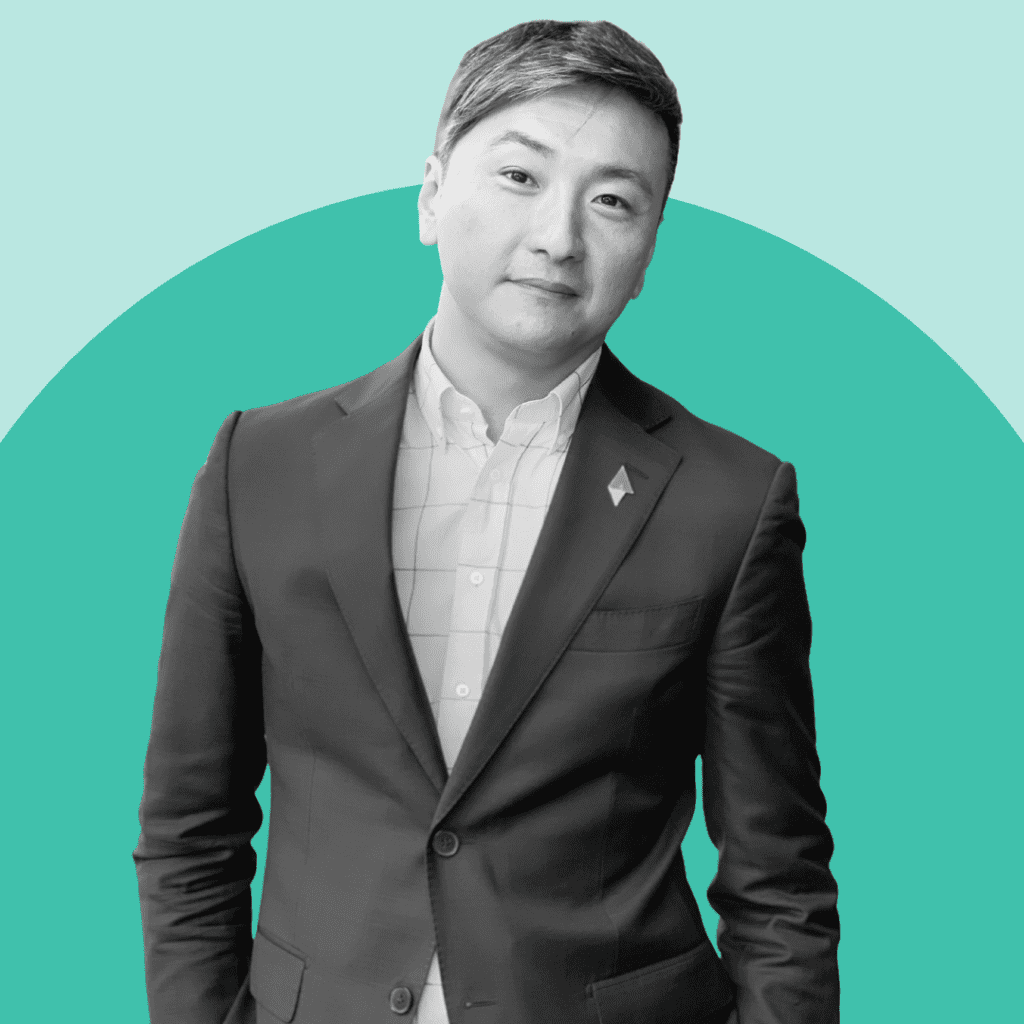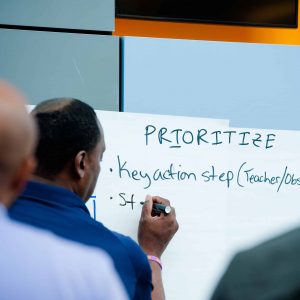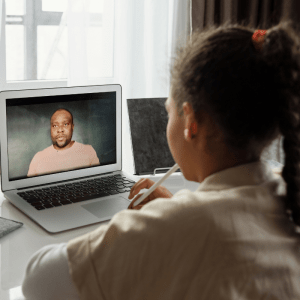
“Our job is to help bring out the very best in people.”
03/16/2022

Leading Educators CEO Chong-Hao Fu on the future of education
At this time of rapid change in the world, I spoke with Leading Educators CEO Chong-Hao Fu about what the near future holds for education and the profession of teaching. He reflects on the need for a richer vision of teaching, opportunities to strengthen the support around educators, and how his personal story motivates him to foster belonging for kids who look to schools to reveal their inherent value.
our Challenges are connected
Adan Garcia: Every day, it feels like our world faces a big new challenge that ultimately affects education in this country. From your vantage point, what are the three most important issues in education right now?
Chong-Hao Fu: One important issue is how we support and reimagine the teaching profession. We’re at a stage in our country where reportedly more than 40% of educators are considering leaving the profession. That should concern everyone.
Not only do all young people deserve great teachers, but they need them. So, at Leading Educators, we’re beginning work with other organizations we admire on ways that we can make the teaching profession more impactful for students, more collaborative, more rewarding, and ultimately more meaningful. That way our educators can continue to stay in the classroom. We need them to play a critical role that no healthy society or democracy can go without.
Another thing that’s top of mind for me right now is the importance of racial equity and mindsets. Mindsets are how we make sense of the world–how we understand why things are the way that they are. Given the disruptions of the past two years, this is an especially important time for all children to feel seen, valued, and supported to learn deeply.
At the most basic level, when students experience something that’s challenging in the classroom, we want them to know that they can meet that challenge. The same goes for teachers. When they’re experiencing incredibly challenging circumstances, we want them to feel reconnected to their values and their why, but they also feel up for meeting this incredible moment that we have in education.
Finally, we’re facing significant challenges around literacy that are decades in the making. Especially for our youngest students and our most vulnerable students, the pandemic has interrupted critical instruction in literacy that builds the foundational skills they need to be strong readers by third grade. As a multilingual learner myself, I know how important it was to feel comfortable learning to read in English. We need to make sure that we’re helping teachers accelerate instruction, making sure that every moment is used for the highest impact.
now is the time to plan for the future
AG: Leading Educators recently announced a major gift that will support plans for growth and innovation. As a leader and career educator, what encourages you about the work that Leading Educators does?
CF: I’m always encouraged that our people stay rooted in our four core values. They lead us to think about ways that we can disrupt racial inequities that have existed in education for hundreds of years, how we really see and build on strengths, and put our energy toward what the community really wants to accomplish. We try to build authentic relationships that allow us to make real change happen because we know that learning is fundamentally about how people connect. And finally, continuous learning has been critical. Change is a constant in education, and we have to be able to evolve to meet the moment.
This approach shows up in our work around our Teaching for Equity framework. We spent almost two years talking to researchers, teachers, and students to understand what it looks like in the classroom when excellent and equitable instruction is taking place.
We uncovered that equitable opportunity is first about having strong relationships. It’s also about making sure that young people feel affirmed in their identities and seen for their full complexity. Third, instructional practices must rigorously pull from what we know from science. The framework blends it all.
This year, we haven’t just been working with teachers, we’ve been talking to students. It’s allowed us to understand how students are experiencing classrooms. We bring that data back to teachers so that they can explore student perceptions as they work to create a classroom that meets the needs of all their learners. That’s been incredibly inspiring work.
change takes a generation
AG: Many of the challenges of the day can feel insurmountable. What’s keeping you up at night?
CF: One thing that keeps me up is how we tell the story of what it takes to improve a whole school system. There’s been tremendous progress to learn from, but our sector often stays fixated on the problems. I look at Chicago Public Schools, one of the lowest-performing school systems in the entire country at the end of the 1980s. Now, they are outperforming many of the neighboring school districts in the state of Illinois. Likewise, we’ve been honored to partner with DC Public Schools, and be a part of their dramatic transformation over the last decade. These examples show that improving school systems is the work of a generation—work that can happen with the right support and determination.
Right now, when we are in our third school year of this pandemic, I think folks can lose patience. We can easily lose hope. And we can also lose sight of the fact that schools are picking up the slack for so many institutions. We have principals who are still managing contact tracing and public health. We have schools that have served as critical distribution points for food and information.
I think we have to be real about how much we’re asking schools to take on at this moment. We should also celebrate the incredible progress that educators have made by being more intentional about teaching and learning. Districts are seeing being wins from connecting teacher support and accountability to what students and families want from schools.
hold onto your values
AG: To close, what keeps you in this work? How does it fit within the mission that you had for yourself when you entered education?
CF: I’ve had the privilege over the last 21 years to work as a teacher, as a principal, and as a partner with school systems across the country. And I’ve had a lot of time to think about why I work in education.
Often, it comes back to the fact that I don’t know if I would be alive today without schools. Particularly as a young, gay, Asian, multilingual learner in Houston, I had a hard time. While I did well in school academically, I had a hard time understanding whether this world was for me. I didn’t know if this world wanted me to be a part of it.
If it were not for teachers who helped me feel seen, connected, valued, I’m pretty sure I wouldn’t be here today. That’s the reason why I feel so privileged to do this work at Leading Educators. We’re pushing the real conversations about how educators should make children feel and support them to learn.
Every day, our job is to help bring out the very best in people. That means thinking about the conditions for teachers to feel more successful and help students feel more seen. How do we ensure students feel connected to their learning and that it offers the tools to unlock their dreams? I feel remarkably privileged to think about how we can be good partners for communities’ aspirations.
This interview has been edited and condensed for clarity.








